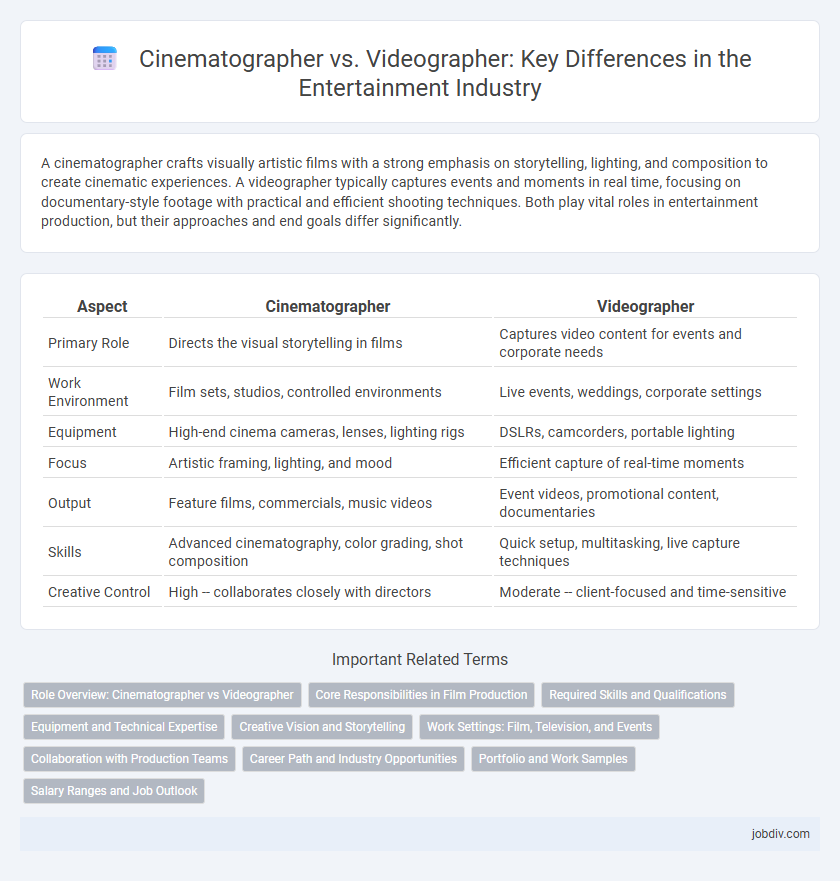A cinematographer crafts visually artistic films with a strong emphasis on storytelling, lighting, and composition to create cinematic experiences. A videographer typically captures events and moments in real time, focusing on documentary-style footage with practical and efficient shooting techniques. Both play vital roles in entertainment production, but their approaches and end goals differ significantly.
Table of Comparison
| Aspect | Cinematographer | Videographer |
|---|---|---|
| Primary Role | Directs the visual storytelling in films | Captures video content for events and corporate needs |
| Work Environment | Film sets, studios, controlled environments | Live events, weddings, corporate settings |
| Equipment | High-end cinema cameras, lenses, lighting rigs | DSLRs, camcorders, portable lighting |
| Focus | Artistic framing, lighting, and mood | Efficient capture of real-time moments |
| Output | Feature films, commercials, music videos | Event videos, promotional content, documentaries |
| Skills | Advanced cinematography, color grading, shot composition | Quick setup, multitasking, live capture techniques |
| Creative Control | High -- collaborates closely with directors | Moderate -- client-focused and time-sensitive |
Role Overview: Cinematographer vs Videographer
A cinematographer, also known as a director of photography, is responsible for crafting the visual style of a film, including lighting, camera movement, and shot composition, to evoke emotion and narrative depth. A videographer typically handles event-based recordings such as weddings or corporate videos, focusing on capturing clear and coherent footage with less emphasis on artistic direction. While cinematographers collaborate closely with directors to achieve a cinematic vision, videographers prioritize efficient, real-time documentation.
Core Responsibilities in Film Production
Cinematographers are responsible for crafting the visual style and mood of a film by managing lighting, camera angles, and shot composition to support the director's vision. Videographers handle capturing live events or smaller productions, often working solo to record footage with more straightforward setups. While cinematographers emphasize artistic storytelling through camera techniques, videographers focus on efficiently documenting events with clear, usable footage.
Required Skills and Qualifications
Cinematographers require advanced knowledge of film cameras, lighting techniques, and visual storytelling to create artistic and narrative-driven footage, often holding degrees in film production or cinematography. Videographers need proficiency in digital cameras, editing software, and real-time shooting skills, commonly backed by experience in event filming or media production. Both professions demand creativity, technical expertise, and strong collaboration abilities to meet project-specific visual requirements.
Equipment and Technical Expertise
Cinematographers use high-end cameras, lenses, and lighting setups to create artistic visual storytelling, emphasizing color grading and composition for films. Videographers typically work with more versatile and portable equipment, suited for events and social media content, focusing on capturing moments efficiently. The technical expertise of cinematographers involves advanced knowledge of film theory and camera technology, while videographers prioritize adaptability and rapid editing skills.
Creative Vision and Storytelling
Cinematographers craft visual narratives by meticulously designing lighting, angles, and camera movement to evoke specific emotions and enhance the story's artistic vision. Videographers focus on capturing authentic moments in real-time with versatility and efficiency, often working in dynamic or event-driven environments. Both roles require a deep understanding of storytelling techniques, but cinematographers emphasize cinematic style while videographers prioritize capturing reality fluidly.
Work Settings: Film, Television, and Events
Cinematographers primarily work on film and television productions, where they collaborate with directors to create visual storytelling through expertly crafted lighting, camera angles, and shot composition. Videographers typically operate in live event settings such as weddings, corporate functions, and concerts, focusing on capturing real-time moments with versatile digital cameras and minimal crew. The distinct work environments influence their technical skills, equipment choices, and artistic approaches to visual content creation.
Collaboration with Production Teams
Cinematographers collaborate closely with directors, lighting technicians, and production designers to create visually compelling narratives by carefully planning camera angles, lighting setups, and shot composition. Videographers often work with smaller production teams or independently, adapting quickly to capture live events or corporate videos, emphasizing flexibility and real-time decision-making. Both roles require strong communication skills and teamwork to ensure the final visual output aligns with the creative vision and production requirements.
Career Path and Industry Opportunities
Cinematographers typically work in film and television, focusing on artistic lighting, framing, and camera movement to create visually compelling narratives, often advancing through roles like camera operator to director of photography. Videographers usually concentrate on events, corporate videos, and online content, requiring versatile skills in shooting and editing with faster project turnarounds and more freelance or small business opportunities. The film industry offers higher-budget projects and union memberships for cinematographers, while videographers gain broader access to diverse commercial work and entrepreneurial ventures.
Portfolio and Work Samples
A cinematographer's portfolio showcases expertly crafted scenes emphasizing storytelling, lighting, and camera techniques aligned with film production quality standards. Videographers typically present diverse work samples highlighting event coverage, corporate videos, and real-time narration, prioritizing versatility and on-the-go filming skills. Evaluating portfolios reveals the cinematographer's focus on artistic composition while the videographer emphasizes adaptability across various projects.
Salary Ranges and Job Outlook
Cinematographers typically earn between $50,000 and $120,000 annually, with salaries influenced by project scale and industry experience, while videographers usually have a salary range of $30,000 to $70,000. The job outlook for cinematographers is projected to grow by 5% over the next decade, driven by demand in film and television production, whereas videographers see a faster growth rate of 11%, fueled by expanding digital media and corporate video content. Both roles require technical expertise, but cinematographers often work on high-budget productions, resulting in higher earning potential and more competitive job prospects.
Cinematographer vs Videographer Infographic

 jobdiv.com
jobdiv.com